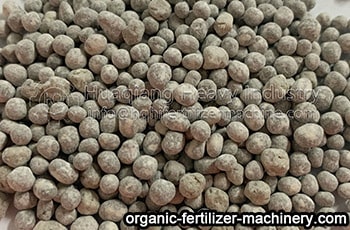How to use organic and inorganic fertilizer together
Organic fertilizer resources are rich and various, including not only manure, straw, green fertilizer, soil and miscellaneous fertilizer, but also cake fertilizer, sea fertilizer, biogas fertilizer, etc. The results showed that the organic-inorganic fertilizer combined application can promote soil nutrient recycling and reuse, increase crop yield, improve the quality of agricultural products, and accelerate the harmless and resource utilization of organic waste, which is the fundamental guarantee for the sustainable development of agriculture. The industrial fertilizer production line also processes organic fertilizer and NPK fertilizer in proportion. So how should organic and inorganic fertilizers be used together?

1. Apply less fertilizer frequently. The nitrate nitrogen and ammonium nitrogen in the compound fertilizer will absorb part of the heat during the dissolution process, which may affect the ground temperature and cause adverse effects on the growth of crop roots. However, the normal growth of crops still needs sufficient supply of nutrients. Therefore, when applying the compound fertilizer in winter, it is necessary to apply less frequently and try to do so in the morning when the weather is fine.
2. Inorganic fertilizer should be applied in combination with pure biological fertilizer (without nitrogen, phosphorus and potassium). Long-term single use of chemical fertilizers will gradually consume the organic matter in the soil, resulting in the reduction of the number of beneficial microorganisms in the soil, the reduction of enzyme content, and the destruction of colloids, resulting in soil compaction, acidification, and salinization. NPK fertilizer and organic bio-fertilizer can improve the soil, reunite the sand, loosen the clay, inhibit the pathogenic bacteria, restore the micro-ecological environment in the soil, enhance the soil permeability, and improve the ability of retaining water and fertilizer. The fertilizer plant uses a disc granulator to process organic and inorganic fertilizers in order to improve fertilizer efficiency.
3. Fertilizer should be applied pertinently. For vegetables such as leafy vegetables, because of their fast growth, high nitrogen demand and low phosphorus demand, the compound fertilizer with high nitrogen content and low phosphorus content should be selected for use; for fruits and melons, the demand for potassium is more in the fruiting period, and the demand for phosphorus is less, so the compound fertilizer with high potassium and low phosphorus can be selected; for the next vegetable seedling, the compound fertilizer with higher phosphorus content can be used as the base fertilizer because of the large demand for phosphorus in the seedling period, Some compound fertilizers with higher phosphorus content were applied after the slow seedling was planted.
The fertilizer granulator manufacturer suggests that the fertilizer should be applied in a scientific way. According to the above principles, the organic and inorganic fertilizers should be used together to improve the agricultural income.

1. Apply less fertilizer frequently. The nitrate nitrogen and ammonium nitrogen in the compound fertilizer will absorb part of the heat during the dissolution process, which may affect the ground temperature and cause adverse effects on the growth of crop roots. However, the normal growth of crops still needs sufficient supply of nutrients. Therefore, when applying the compound fertilizer in winter, it is necessary to apply less frequently and try to do so in the morning when the weather is fine.
2. Inorganic fertilizer should be applied in combination with pure biological fertilizer (without nitrogen, phosphorus and potassium). Long-term single use of chemical fertilizers will gradually consume the organic matter in the soil, resulting in the reduction of the number of beneficial microorganisms in the soil, the reduction of enzyme content, and the destruction of colloids, resulting in soil compaction, acidification, and salinization. NPK fertilizer and organic bio-fertilizer can improve the soil, reunite the sand, loosen the clay, inhibit the pathogenic bacteria, restore the micro-ecological environment in the soil, enhance the soil permeability, and improve the ability of retaining water and fertilizer. The fertilizer plant uses a disc granulator to process organic and inorganic fertilizers in order to improve fertilizer efficiency.
3. Fertilizer should be applied pertinently. For vegetables such as leafy vegetables, because of their fast growth, high nitrogen demand and low phosphorus demand, the compound fertilizer with high nitrogen content and low phosphorus content should be selected for use; for fruits and melons, the demand for potassium is more in the fruiting period, and the demand for phosphorus is less, so the compound fertilizer with high potassium and low phosphorus can be selected; for the next vegetable seedling, the compound fertilizer with higher phosphorus content can be used as the base fertilizer because of the large demand for phosphorus in the seedling period, Some compound fertilizers with higher phosphorus content were applied after the slow seedling was planted.
The fertilizer granulator manufacturer suggests that the fertilizer should be applied in a scientific way. According to the above principles, the organic and inorganic fertilizers should be used together to improve the agricultural income.

评论
发表评论